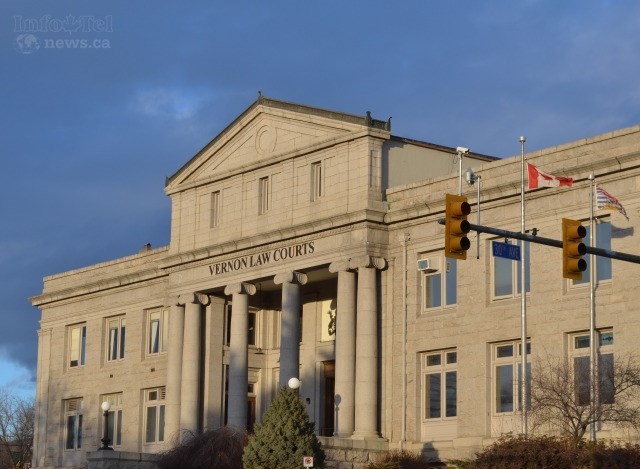
Vernon Courthouse
(CHARLOTTE HELSTON / iNFOnews.ca)
February 20, 2017 - 8:00 PM
VERNON - The violation of a man's rights by police was so egregious, a Vernon judge has thrown out a drug trafficking case to make up for it.
Provincial Court Judge Mayland McKimm called it one of the clearest cases where a judicial stay of proceedings is required.
The accused, Christopher Edvin Omar Hjerpe, was charged with two counts of possession of cocaine and heroin for the purpose of trafficking stemming from a February 2014 police investigation in the Vernon area, according to a written judgement dated Jan. 25, 2017.
Police learned from an informant that a vehicle being used to deliver drugs in the Vernon area and officers conducted surveillance of the vehicle on Feb. 25, 2014. Within half an hour, police saw three people make what appeared to be brief transactions at the vehicle. The accused was the only person seen driving the vehicle during that time.
Officers arrested Hjerpe, and a search of the vehicle turned up just over two grams of heroin in nine separate packages, and just over six grams of cocaine, also in various packages, as well as $1,115 in cash. The accused had $773 on him.
Hjerpe immediately asked to speak to a lawyer, McKimm said in the ruling.
“Prior to being transported back to the detachment, the officer-in-charge of the investigation ordered that the accused be subject to a strip search immediately upon his arrival at the police station,” McKimm said.
There was no evidence provided by the officers as to the necessity of conducting a strip search, McKimm said.
The search, which was done in the detachment’s ‘booking area’, occurred in the presence of a civilian guard who observed the entire procedure.The accused was asked to lower his pants and underwear, bend over, and reveal his rectum. The room itself was video monitored, and McKimm said the search was “available for observation on a closed-circuit television” which enhanced the violation of privacy.
“No inquiries were made of the accused with respect to any religious or cultural concerns with respect to this invasion of privacy. It is significant to note that none of the officers have made any detailed notes with respect to the circumstances of the strip search of the accused,” McKimm said.
After Hjerpe spoke to a lawyer, a decision was made to hold him overnight for court the following day, despite the fact the officers knew court was available for a bail hearing that afternoon and “most certainly” were aware that a bail hearing by telephone was available 24 hours a day, McKimm said.
McKimm said the officers had reasonable grounds to make the arrest, but things went downhill from there. He said there were no reasonable grounds to justify the invasive strip search, and said it was not conducted in a way that minimized the invasion of the accused’s privacy.
“The search in question raises serious concerns with respect to the efforts made to preserve the privacy and dignity of the accused,” McKimm said.
“I would also note that no effort was made by the investigating officers to determine either any religious concerns of the accused nor whether the strip search in question would raise any concerns with respect to the sexual orientation of the accused. In my view, it is incumbent on authorities conducting invasive strip searches that they make inquiries with respect to whether or not those searches would be particularly offensive to the individual as a result of considerations of either culture or sexual orientation,” McKimm said.
The Supreme Court of Canada has found that strip searches are a very serious violation of the integrity and dignity of citizens and has crafted detailed considerations to ensure that the serious invasion of privacy occurs only when absolutely necessary.
“The investigating authorities appear to have no understanding of these fundamental principles,” McKimm said.
He also ruled that Hjerpe’s rights were violated when police detained him for 26 hours after his arrest.
“The officer was not familiar with the requirement that citizens be released as soon as practicable but rather held the erroneous view that the police had the privilege of holding accused persons for 24 hours as a result merely of their arrest,” McKimm said.
He said the seriousness of the two breaches “completely outweighs society’s interest in adjudicating the case on its merits.”
The appropriate remedy, McKimm ruled, was a judicial stay of proceedings, which must only be granted in the clearest cases and when no other remedy will do.
To contact a reporter for this story, email Charlotte Helston or call 250-309-5230 or email the editor. You can also submit photos, videos or news tips to the newsroom and be entered to win a monthly prize draw.
We welcome your comments and opinions on our stories but play nice. We won't censor or delete comments unless they contain off-topic statements or links, unnecessary vulgarity, false facts, spam or obviously fake profiles. If you have any concerns about what you see in comments, email the editor in the link above.
News from © iNFOnews, 2017